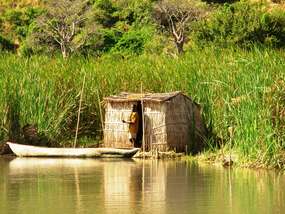Lake Chilwa Basin Climate Change Adaptation Programme

The Lake Chilwa Basin Climate Change Adaptation Programme (LCBCCAP) is a five-year programme whose overall goal is to secure the livelihood of 1.5 million people in the Lake Chilwa Basin and enhance resilience of their natural resource base.
The programme aims to achieve this goal through development and implementation of basin-wide climate change adaptations in support of the Malawi National Adaptation Programmes of Action (NAPA) to enhance the capacity of communities to adopt sustainable livelihood and natural resource management practices.
The Programme focuses on enhancing the resilience of rural communities surrounding the Lake Chilwa, which is a wetland of international significance to the impacts of droughts and floods that have become more frequent in recent years.
Key messages and learning outcomes
Awareness-raising and capacity building are key to climate change adaptation programmes.
The Programmes uses joint planning and implementation approaches in which the knowledge and skills of specialists from partner institutions are actively engaged in the Programme’s activities. In addition, the Programme incorporates a capacity building component through which policy makers and district technical personnel (Machinga, Phalombe and Zomba) have been trained in climate change.
Methodology
We are employing an ecosystem-based approach and integrating participatory adaptive research, capacity development and outreach as key elements of the implementation strategy. Programme activities include strengthening local and district institutions to sustainably manage natural resources and build resilience to climate change; facilitate cross-basin and cross-sector natural resource management and planning for climate change; improving household and enterprise adaptive capacity; and promoting mitigation of the effects of climate change through improved forest management and governance.
Natural resource monitoring is done for biodiversity (vegetation and birds), river discharge and lake level, soil erosion and basic elements of weather (rainfall and temperature). In this regard, we have rehabilitated and installed weather monitoring stations in the basin. Carbon stock assessment is being piloted at a demonstration forest reserve at Chancellor College.
As part of outreach, the Programme is facilitating dialogue and action on climate change through establishment of rural radio listening clubs, which facilitate interaction among the community, local service providers and the programme implementation team on finding solutions to pressing community challenges in addressing climate change. So far, the Programme has facilitated implementation if environmentally friendly technologies such as improved fish smoking kilns, solar fish dryers, conservation agriculture, rehabilitation of Zomba Mountain Forest Reserve and other community managed forests. These activities are done with rural communities in the basin.
Key challenges
The programme is on-going but the key challenges that we are facing are on balancing people’s demand for natural resources exploitation with conservation efforts and behavioural change.
What advice would you give to others taking on similar work?
Most importantly, such programmes should be flexible to integrate the views of local people (i.e. integrate indigenous knowledge) and evolve with time to fulfill both the community and ecological adaptation requirements. Awareness-raising and capacity building are key to climate change adaptation programmes. In this Programme, we are collaborating with the development unit of the national radio and TV broadcasting station to establish rural radio listening clubs that act as a forum for sharing views and experiences on climate change including mitigation and adaptation.
See more information and location on the Google Earth Adaptation Layer.
Partners
Prof. Sosten S. Chiotha Dr. Daniel Jamu Dr. Clement Chilima
Participating organisations
LEAD Southern and Eastern Africa WorldFish Center Malawi Department of Forestry (Forest Research Institute of Malawi)
(0) Comments
There is no content